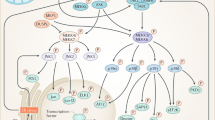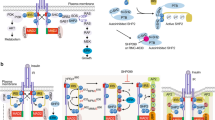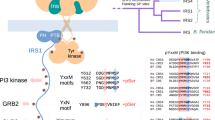Abstract
Insulin resistance refers to a decreased capacity of circulating insulin to regulate nutrient metabolism. It is associated with the development of type II diabetes, a 21st century epidemic. Recent studies reveal that agents that induce insulin resistance exploit phosphorylation-based negative feedback control mechanisms otherwise utilized by insulin itself, to uncouple the insulin receptor from its downstream effectors and thereby terminate insulin signal transduction. This article focuses on the cardinal role of Ser/Thr protein kinases, which phosphorylate insulin receptor substrates, as key players in the uncoupling of insulin signaling and the induction of an insulin resistance state.
This is a preview of subscription content, access via your institution
Access options
Subscribe to this journal
Receive 12 print issues and online access
$259.00 per year
only $21.58 per issue
Buy this article
- Purchase on Springer Link
- Instant access to full article PDF
Prices may be subject to local taxes which are calculated during checkout
Similar content being viewed by others
Author information
Authors and Affiliations
Corresponding author
Rights and permissions
About this article
Cite this article
Zick, Y. Role of Ser/Thr kinases in the uncoupling of insulin signaling. Int J Obes 27 (Suppl 3), S56–S60 (2003). https://doi.org/10.1038/sj.ijo.0802503
Published:
Issue Date:
DOI: https://doi.org/10.1038/sj.ijo.0802503
Keywords
This article is cited by
-
L-Citrulline increases hepatic sensitivity to insulin by reducing the phosphorylation of serine 1101 in insulin receptor substrate-1
BMC Complementary and Alternative Medicine (2015)
-
Prevention of Hyperglycemic Signal Pathways in Metabolic Syndrome Carotid Artery of Rats
Translational Stroke Research (2012)
-
Hepatic and adipocyte cells respond differentially to iron overload, hypoxic and inflammatory challenge
BioMetals (2012)
-
Global IRS-1 phosphorylation analysis in insulin resistance
Diabetologia (2011)
-
Nitric oxide agents impair insulin-mediated signal transduction in rat skeletal muscle
BMC Biochemistry (2006)



